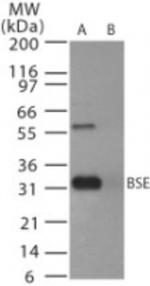Search Thermo Fisher Scientific
FIGURE: 1 / 1
PrP Antibody (PA1-41373) in WB

Product Details
PA1-41373
Species Reactivity
Host/Isotype
Class
Type
Immunogen
Conjugate
Form
Concentration
Purification
Storage buffer
Contains
Storage conditions
Shipping conditions
RRID
Product Specific Information
Suggested positive control: recombinant fusion protein.
Target Information
Human prion protein (PrP), also known as PRNP, is a ubiquitously expressed GPI-anchored cell surface glycoprotein associating with lipid raft components and functioning as a signaling molecule. PrP plays a role in apoptosis in a cell context-dependent manner, is involved in proliferation of epithelial cells and in distribution of junction-associated proteins in human enterocytes. Conversion of this normal cellular prion protein (PrPc) into an abnormal conformer (PrPSc) is the crucial step associated with triggering the pathogenesis of the prion neurodegenerative disorders, such as the Creutzfeld-Jakob disease (CJD). Whereas PrPc is rich in alpha-helices, the PrPSc form has higher content of beta-sheets and is resistant to proteinase K.
For Research Use Only. Not for use in diagnostic procedures. Not for resale without express authorization.
References (0)
Bioinformatics
Protein Aliases: Alternative prion protein; AltPrP; BSE; CD230; Major prion protein; Major scrapie-associated fibril protein 1; MGC26679; PK resistant core; prion protein (p27-30) (Creutzfeldt-Jakob disease, Gerstmann-Strausler-Scheinker syndrome, fatal familial insomnia); prion protein precursor PrP; prion protein PrP; prion protein variant a; prion protein variant b; PrP; PrPc; TSE
Gene Aliases: AltPrP; prn; PRNP; PRP; PRPC; SIP
UniProt ID: (Bovine) F7VJQ2, (Sheep) P23907
Entrez Gene ID: (Bovine) 281427, (Sheep) 493887

Performance Guarantee
If an Invitrogen™ antibody doesn't perform as described on our website or datasheet,we'll replace the product at no cost to you, or provide you with a credit for a future purchase.*
Learn more
We're here to help
Get expert recommendations for common problems or connect directly with an on staff expert for technical assistance related to applications, equipment and general product use.
Contact tech support
